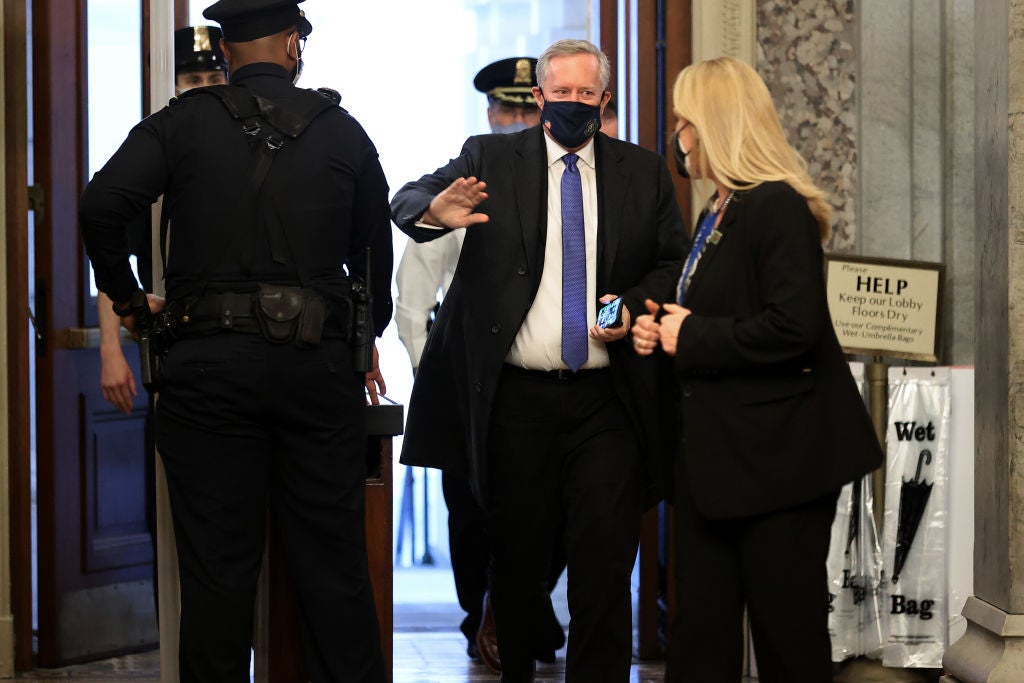Mark Meadows lawyer makes last-ditch argument to get Capitol riot committee to drop contempt of Congress vote
Mr Meadows’ attorney says referring the ex-congressman for prosecution ‘would be contrary to law, manifestly unjust, unwise, and unfair’

The attorney representing ex-Trump White House chief of staff Mark Meadows has made a last-ditch attempt to convince the House committee investigating the 6 January insurrection not to advance a referral for criminal contempt of congress against the former North Carolina congressman.
In a letter sent Monday to select committee chairman Bennie Thompson, vice chair Liz Cheney and the other seven committee members, attorney George Terwilliger wrote that referring Mr Meadows to the Justice Department for possible prosecution under the criminal contempt statute “would be contrary to law, manifestly unjust, unwise, and unfair,” and “would ill-serve the country” by engaging in a “rush to judgment”.
The select committee is set to approve a report recommending criminal contempt charges against Mr Meadows at 7pm on Monday, just days after Mr Meadows failed to appear to give evidence at a long-delayed deposition. In a letter sent to Mr Thompson last week, Mr Terwilliger said his client would not honour his agreement to answer committee members’ questions because the committee had also subpoenaed records of communications made with Mr Meadows’ private mobile phone from his wireless service provider.
Mr Meadows has claimed that cooperating further with the committee’s inquiry would require him to discuss matters covered by executive privilege, a legal doctrine which shields communications between and among a president and his advisers.
But the current executive, President Joe Biden, has heretofore declined to assert the privilege over records, communications, and testimony sought from Trump administration officials in the course of the select committee’s probe into the worst attack on the US Capitol since Major General Robert Ross ordered British troops to set it ablaze in 1814.
Multiple federal courts have also rejected claims by former president Donald Trump that he may still invoke the privilege to block the National Archives and Records Administration from releasing White House records which Mr Biden has ordered to be turned over to the select committee.
The former president, who routinely ordered aides to ignore congressional inquiries during his four years in the White House, has continued to exhort his former advisers to reject the legitimacy of investigations conducted by the Democratic-led House of Representatives. Multiple ex-Trump administration officials have refused to cooperate with the probe on Mr Trump’s orders. One such former official – ex-White House chief strategist Steve Bannon – is currently set to go on trial for criminal contempt of congress in the summer of 2022.
Despite the courts’ rejection of privilege claims by Mr Trump, Mr Terwilliger went on to argue in his letter that referring Mr Meadows for contempt charges would be “contrary to law” because his client has made “a good-faith invocation of executive privilege and testimonial immunity,” the latter argument being one that was also rejected by the courts when another White House official, ex-White House Counsel Don McGahn, was compelled to give evidence before the House Judiciary Committee earlier this year.
Nonetheless, Mr Terwilliger argued that a referral of Mr Meadows “would ignore the statute’s legislative history and historical application, contravene well-established separation of powers principles, and improperly impute a criminal intent to a good-faith actor”.
Such a referral, he wrote, “would be an unfair exercise of bad faith because one essential element of that offense is not present and provable in this case,” because — in his rendering of events — Mr Meadows does not intend to violate the law but is instead attempting to honour Mr Trump’s invocation of executive privilege.
“As to any alleged criminal violation generally and as to this violation specifically, as a matter of law there must be a showing of criminal intent to do wrong. A referral of criminal contempt of Congress for an individual who on a good-faith basis asserts a privilege not to appear and to provide privileged information would improperly impute mens rea to a good-faith actor,” he wrote. “A senior executive official who refuses to provide privileged information or who refuses to testify based on a good-faith belief that their legal position is one that is required and supported by lawful authority does not ‘willfully’ default on a congressional subpoena. Because their claim of privilege is in good faith, they lack the necessary ill-intent to satisfy the statutory language”.
A spokesperson for the select committee declined to comment to The Independent when asked if Mr Thompson had a response to Mr Terwilliger’s last-minute entreaties.
Join our commenting forum
Join thought-provoking conversations, follow other Independent readers and see their replies
Comments
Bookmark popover
Removed from bookmarks